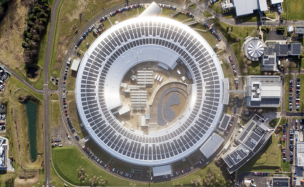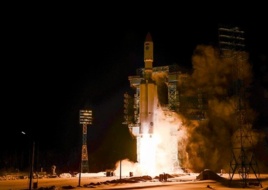The 119th Congress is off to a hot start—and space is no exception.
Amid the mile-a-minute news cycle that is 2025 so far, we can’t blame you if you’ve missed some of the space action on Capitol Hill. So here are five things we’ve been watching over the past week:
Lutnick advances: The Senate Commerce, Science, and Transportation Committee approved the nomination of Howard Lutnick to be commerce secretary along a primarily party line 16-12 vote—Sen. John Fetterman (D-PA) was the only Dem to vote to advance his nomination. During his confirmation hearing last month, Lutnick talked about the importance of supporting the US space industry, including ensuring companies have more access to in-demand mid-band spectrum. Next up is a vote in the full Senate.
Space legislation: A bipartisan group of senators reintroduced the Situational Awareness of Flying Elements (SAFE) in Orbit Act, which would formally authorize the Office of Space Commerce’s space traffic cooperation project. The bill, which passed the Senate by unanimous consent in the waning days of the last Congress, would aim to make SSA data more widely available and encourage companies to share data to avoid collisions in orbit.
Cantwell warns FAA: Sen. Maria Cantwell (D-WA), the ranking member of the Senate commerce committee, is trying to make sure Elon Musk’s interests as the head of SpaceX do not interfere with the FAA’s role in regulating commercial space launch. In a letter to Transportation Secretary Sean Duffy, Cantwell worried about a potential conflict of interest because of Musk’s leadership role at the Department of Government Efficiency.
“Elon Musk’s SpaceX rocket launches share the airspace with commercial airplanes, and the FAA has the responsibility for keeping the entire airspace safe,” she wrote. “We have ethics and recusal laws for a reason—to prevent corporate interference in protecting the public interest.”
Elon and NASA: House Dems have their own concerns about Elon’s involvement in the federal government. Democratic leaders on the House Science, Space, and Technology Committee sent a letter to NASA Acting Administrator Janet Petro expressing concerns about DOGE accessing classified or proprietary data at NASA, given SpaceX’s $2B worth of contracts with the space agency.
“We intend to closely monitor the broad potential for conflicts-of-interest between DOGE, SpaceX and NASA,” Reps. Zoe Lofgren (D-CA) and Valerie Foushee (D-NC) wrote in a letter. “NASA possesses highly sensitive proprietary data related to the capabilities and contractual obligations of its contractors—some of whom are or could become direct competitors to SpaceX and may compete with SpaceX for forthcoming agency contracts. The possibility that such proprietary data could be obtained by the CEO of SpaceX without regard to NASA procurement rules and regulations risks compromising the integrity of NASA procurement decisions in the future.”
Lofgren and Foushee also released a statement slamming the Trump administration after NASA employees were reportedly banned from displaying symbols supporting the LGBT community.
House Dem roster: Democrats on the House Science, Space, and Technology Committee also formally organized and released their roster (Republicans did the same last month). For Democrats, the panel’s space subcommittee features all new members compared to the prior Congress, with Fourshee at the top as ranking member. Other members include Reps. Laura Gillen (D-NY), George Whitesides (D-CA), Haley Stevens (D-MI), and Andrea Salinas (D-OR).
What’s next: We’re still waiting for the Senate committee to schedule a hearing to consider NASA chief nominee Jared Isaacman, who shared on X that he is preparing for his confirmation.
“Can’t comment on space, but eager to earn the Senate’s trust. If confirmed, I’ll work tirelessly w/the brightest minds at the greatest space agency to deliver on the President’s vision. The 2nd space age is just beginning,” he wrote.




